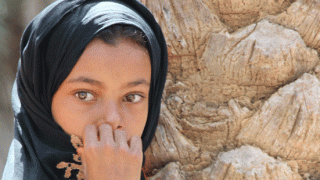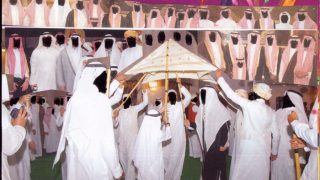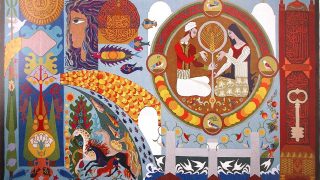On Nov. 6, 2012, the Bahraini interior minister issued a decision to strip 31 Bahrainis of citizenship for "causing damage to state security." The first reactions to this decision focused on a legal flaw in the decision, based on the fact that revoking one's citizenship is not the prerogative of the minister, but rather falls under the jurisdiction of the king himself, and only after he has exhausted a a number of procedures set forth in the applicable laws.
Despite the flaws in those laws, they do not allow the authorities to strip someone of citizenship unless it has been proven that he committed an act of treason, acquired citizenship through fraud or deception, or in the event that he is giving up his Bahraini citizenship in order to retain citizenship in another country that does not allow for dual citizenship.
Legal experts and human rights activists have pointed out that the interior minister's decision violates current Bahraini laws and the country's constitution, not to mention international conventions that the country has pledged to abide by.
These legal and human rights-based objections, alongside other objections, have had real repercussions even in countries outside Bahrain, especially in the latter's partners in the Gulf Cooperation Council (GCC). The GCC is ruled by regimes of a "special type," whose legitimacy is based on a mixture of two very different elements. The first consists of tribal customs that perpetuate the idea of war spoils as the basis for legitimacy. The second element consists of these regimes' role in perpetuating imperialists' hegemony in the region. The illegal procedures carried out by the minister of interior in Bahrain are not incidental or unique, rather they are consistent with the vision shared by all of the ruling families in the GCC countries regarding their relationships with their subjects.
Bahrain and its partners
There is not much difference among the laws in force in various GCC countries regarding the "conditions" under which a national can be stripped of citizenship, whether he or she is a native-born citizen or naturalized. However, the Gulf states — without exception — do not adhere to these laws.
In early 2005, the emir of Qatar decided to revoke citizenship from nearly 6,000 members of the Al-Murrah tribe. This was a shocking decision, not only because it represented a form of collective punishment — that included all members of the tribe — but the consequences of this decision were also immense. Thousands of Qataris found their legal status had been changed from citizen to foreigner, meaning that they had to obtain a permit to reside in their own country. It also meant they were fired from their jobs, and forbidden from dealing in certain types of trade and working in some professions. They were no longer entitled to pensions, and could no receive services provided for citizens, such as health care and education, including scholarships to study overseas.
Approximately one year ago, Sheikh Khalifa bin Zayed, the president of the United Arab Emirates, issued an order stripping seven Emiratis of citizenship who had been accused belonging to the banned Muslim Brotherhood, and "taking part in activities that threatened the national security of the UAE." Naturally, the accused did not benefit from appealing to various levels of the judiciary. After a year of legal formalities, the federal appellate court of Abu Dhabi refused to even look at their appeal against the unjust decision against them.
In the past month, the Saudi king has issued a number of decrees to confront protests that have occurred in the eastern regions of the kingdom. One of those decrees authorized the withdrawal of citizenship from every Saudi involved in the protests, without the possibility of a royal pardon in the future! Social media sites in Saudi Arabia reported that the authorities had mentioned 300 activists in these decrees.
Although recorded human rights violations in Kuwait and Oman do not include collective revocation of nationality, the limited revocation of nationality in the two countries on an individual basis does not mean that it does not affect the fate of the children of those targeted or other members of his family. Despite the differences in circumstances and details, there is a common denominator among these cases. What does the emir of Qatar's decision to strip 4% of his country's citizens of nationality have in common with the Saudi authorities' threats to strip those who participate in protests of citizenship — or with Bahrain and the UAE stripping opposition members of citizenship? In these countries, a passport is not a right of citizenship, but rather an honor bestowed by the royal family, given to whom it wants and taken from whom it wants of its subjects.
The passport, a right or an honor?
The oil boom in the '70s changed many things in the Gulf countries, including transforming the passport into an important tool used by the royal families in distributing oil revenues. Before the boom, it was easy to obtain a UAE passport from one of the sheikhs of the small emirates (Fujairah, Umm Al Quwain, Ajman and Ras Al Khaimah). At the time, the fees associated with issuing and renewing passports constituted an important source of income for these sheikhs. On the other hand, the ruling families in the richer emirates — who didn't need to sell passports — would use offers of citizenship as a way to gain the loyalty of tribes in the border areas, and as a means of including them in their armed forces and security apparatuses.
Things have changed completely since the mid-'70s. Oil revenues have contributed to unprecedented growth in economic activity, including the establishment of joint-stock companies, increased speculation in these companies' shares, high real estate and land prices, a stampede of foreign investors into the Gulf market, as well as increased demand for importing foreign labor. The oil boom has provided an opportunity for ruling families to use the Gulf passport as a testament to a "golden deal": wealth and authority for the ruling family, in exchange for benefits for the people.
Gulf citizenship — or rather a Gulf passport — became a key providing access to the comforts of oil revenues. The "passport" is no longer merely a document for facilitating the movement of people across borders, but rather it became a necessary means of achieving benefits, either through passport holders directly being included in various market activities, or through them "leasing" their passports to others. I'd like to point out that these benefits awarded to Gulf passport holders varied according to standards put in place and applied by the ruling family. As a result, members of the opposition were not able to enjoy the same advantages provided to regime supporters, according to varying degrees of loyalty.
The prevailing laws at the time stipulated that, in every Gulf country, only citizens could participate in these economic activities. As a result, in many families, you can find siblings and relatives holding citizenship from all six of the GCC countries. There are a number of senior Gulf businessmen who hold citizenship from multiple Gulf countries at the same time, as a means of allowing them to participate in business ventures that are limited to only citizens. Because of the "local partner" requirement, those who wanted to invest in a given country had to find a local citizen to be a nominal partner. Thus, Gulf countries saw the emergence of the phenomenon of "covers", whereby this nominal partner maintained the largest number of shares in the company, and registered work visas for hundreds of foreign workers in his name. Likewise, there are now thousands of citizens in Gulf countries who make a living off the commission — whether fixed or continuous — that they receive for their role as nominal partners for foreign business owners.
From rewarding loyalty to punishing opposition
The paradise provided by oil revenue is no longer what it once was at the height of the oil boom. The financial returns have eroded due to rampant corruption, poor planning and administration, billion-dollar arms deals, as well as the ruling families of the Gulf getting involved in financing a number of regional wars and conflicts over the past four decades.
All of this is reflected in a number of successive shocks that led to the explosion of the investment bubbles in the Gulf countries, especially in the stock and real estate markets. An example of this is what they call the "Dubai crisis." Before the crisis, this shining emirate appeared to revel in unimaginable abundance and opulence.
Another such crisis was the budget deficit crisis that affected Saudi Arabia at the beginning of the 21st century. This crisis lasted several years and led to the state's internal and external debts rising to several billion dollars.
Similarly, this decrease in oil profits is reflected in the amount allocated from the general budget to social services, including health care and education. However, in turn, the provisions that the GCC countries had to abide by in order to join the World Trade Organization and to sign free trade agreements with the United States led to a reduction in investment advantages provided to those who held Gulf citizenship.
The Gulf passport no longer maintains the same importance it once had, it no longer serves as a "golden deal", which throughout four decades guaranteed the stability of the Gulf countries despite the tremors that struck neighboring countries. The passport alone was no longer a sufficient means to achieve monetary comfort.
However, the passport has not lost its political role, on at least two fronts. The first is constantly linked to "collective naturalization" of military recruits from neighboring countries, as a means of securing continued expansion of the military and security institutions in all of the GCC countries. The second front involved revoking citizenship, or threatening to revoke citizenship, from those who hold it. As we saw in Qatar, the UAE, Saudi Arabia and Bahrain, threatening to revoke — or not renew — one's citizenship has become one of the tools used by security forces to control citizens, as well as a form of punishment for those whom the authorities wish to deny their generosity.
These incidents of collective naturalization, along with cases of collective revocation of citizenship, resemble an official declaration of the idea that the ruling families do not consider citizenship to be a right for citizens in these countries, but rather they consider it a gift that they bestow upon the people. The ruling family reserves the right to grant or revoke this gift at any time. However, this official statement is not a sign of dynamism or strength.
The ruling families in the GCC countries are now in front of a historic juncture, that is in direct contrast to what they have experienced since the beginning of the oil boom forty years ago. They have no way — neither financially nor politically — to revive these "golden deals". As a result, the ruling family in each of these countries is facing a crisis of legitimacy, varying in severity from one country to the next.
However, for the first time, they are all faced with the fact that they no longer are capable of using oil revenues to control their subjects and reshape their societies. The external commitments of these countries have increased, including obligations imposed by rotating a large portion of oil revenues through depositing them in international banks, foreign investment, importing arms from Western countries, as well as additional obligations imposed by the efforts of a number of Gulf countries to contain the fallout of ongoing uprisings in the Arab world.
In front of this historic crossroads, the ruling families find themselves with limited choices, all with high political costs and uncertain consequences. Because of this, we see these families stumbling and taking decisions that will only increase the structural crisis impeding them from transforming from political/tribal organizations into nations that belong to the 21st century.
Translated by Al-Monitor



